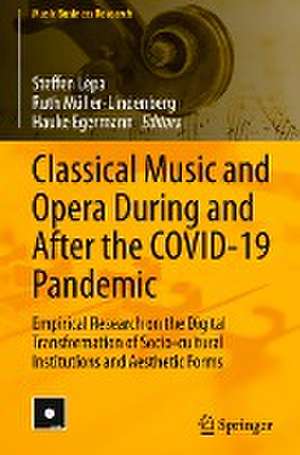Classical Music and Opera During and After the COVID-19 Pandemic: Empirical Research on the Digital Transformation of Socio-cultural Institutions and Aesthetic Forms: Music Business Research
Editat de Steffen Lepa, Ruth Müller-Lindenberg, Hauke Egermannen Limba Engleză Hardback – 10 noi 2023
This book is particularly useful for students and researchers in music and media management, as well as musicology. It is also intended to help practitioners from concert houses and opera management, such as dramaturges, artistic directors, marketing and communication directors.
Preț: 890.54 lei
Preț vechi: 1086.03 lei
-18% Nou
Puncte Express: 1336
Preț estimativ în valută:
170.40€ • 178.39$ • 140.100£
170.40€ • 178.39$ • 140.100£
Carte disponibilă
Livrare economică 17-31 martie
Preluare comenzi: 021 569.72.76
Specificații
ISBN-13: 9783031429743
ISBN-10: 3031429745
Pagini: 151
Ilustrații: IX, 151 p. 14 illus., 13 illus. in color.
Dimensiuni: 155 x 235 mm
Greutate: 0.43 kg
Ediția:1st ed. 2023
Editura: Springer Nature Switzerland
Colecția Springer
Seria Music Business Research
Locul publicării:Cham, Switzerland
ISBN-10: 3031429745
Pagini: 151
Ilustrații: IX, 151 p. 14 illus., 13 illus. in color.
Dimensiuni: 155 x 235 mm
Greutate: 0.43 kg
Ediția:1st ed. 2023
Editura: Springer Nature Switzerland
Colecția Springer
Seria Music Business Research
Locul publicării:Cham, Switzerland
Cuprins
Chapter 1 Quo Vadis Classical Music? Remarks on the Post-Pandemic Condition.- Chapter 2 Opera (Training (Research)) During Lockdown.- Chapter 3 The pandemic as a peephole into the ongoing digital transformation of opera. Insights from an expert interview study with the management of Berlin’s three opera houses.- Chapter 4 The Role of Artistic Directors of Classical Music Festivals in COVID-19 Crisis Communication.- Chapter 5 Streaming Opera: Compromise Solution or Future-Oriented Reception Form?.- Chapter 6 Digital Concert Experience – An online research project on live streaming during the pandemic.- Chapter 7 Did lockdowns stimulate digital cultural participation? Mapping the post-pandemic Berlin classical concert audience and its adoption of audiovisual concert streams.- Chapter 8 Combining two different worlds. A post-pandemic interview with the dramaturgs Dr. Merle Fahrholz and Dr. Ulrich Lenz.
Notă biografică
Steffen Lepa is a Postdoc Media and Communication Scholar leading the computational musicology team of the Audio Communication Group at Technische Universität Berlin (Germany). He is the Editor-in-Chief of the online knowledge portal ‘Musik und Medien’. Steffen was a Guest Professor for Music and Media at Hanover University of Music, Drama, and Media, a Principal Investigator at the Horizon 2020 project ‘abc_dj’, and a Scientific Collaborator in the cluster-of-excellence research project ‘Medium und Emotion’.
Ruth Müller-Lindenberg is a Professor of Historical Musicology at the Hanover University of Music, Drama, and Media (Germany). Previously, Prof. Müller-Lindenberg was the orchestra manager and deputy artistic director of the Berlin Symphony Orchestra (1992/93). She also served as the Head of the Department for Music Theater, Dance, Music in the Berlin Senate Department for Cultural Affairs and was a Head of Department in the Office of the Federal President of Germany(2003–2006). Her research interests include music aesthetics, music criticism, and music theater.
Hauke Egermann is a Professor in Systematic Musicology at the Institute of Music and Musicology, TU Dortmund University (Germany). He graduated in Systematic Musicology, Media Science, and Communication Research and then studied neuroscience, earning a Ph.D. in Music Psychology/Neuroscience from the Centre for Systemic Neuroscience Hannover (Germany). He was an Assistant Professor and later an Associate Professor at the Department of Music, University of York, UK, where he founded and directed the York Music Psychology Group.
Ruth Müller-Lindenberg is a Professor of Historical Musicology at the Hanover University of Music, Drama, and Media (Germany). Previously, Prof. Müller-Lindenberg was the orchestra manager and deputy artistic director of the Berlin Symphony Orchestra (1992/93). She also served as the Head of the Department for Music Theater, Dance, Music in the Berlin Senate Department for Cultural Affairs and was a Head of Department in the Office of the Federal President of Germany(2003–2006). Her research interests include music aesthetics, music criticism, and music theater.
Hauke Egermann is a Professor in Systematic Musicology at the Institute of Music and Musicology, TU Dortmund University (Germany). He graduated in Systematic Musicology, Media Science, and Communication Research and then studied neuroscience, earning a Ph.D. in Music Psychology/Neuroscience from the Centre for Systemic Neuroscience Hannover (Germany). He was an Assistant Professor and later an Associate Professor at the Department of Music, University of York, UK, where he founded and directed the York Music Psychology Group.
Textul de pe ultima copertă
The global COVID-19 pandemic, the resulting lockdown imposed in many countries, as well as related safety measures taken by governments and authorities, have posed significant challenges to classical music culture. However, they may also have had a stimulating effect on music festivals and opera houses’ streaming offerings. This book brings together experts from the fields of musicology and music management to share their current empirical research findings on the pandemic-evoked digital transformation of the classical music scene, addressing either the institutional or the reception perspective. Furthermore, it documents discussions with opera dramaturgs and artistic directors, as well as music managers and event producers in the classical field, to share their practical lockdown experiences and current strategies in dealing with the digital transformation of opera. In this way, the volume combines the perspective of academic researchers with that of practitioners in the field.
This book is particularly useful for students and researchers in music and media management, as well as musicology. It is also intended to help practitioners from concert houses and opera management, such as dramaturges, artistic directors, marketing and communication directors.
This book is particularly useful for students and researchers in music and media management, as well as musicology. It is also intended to help practitioners from concert houses and opera management, such as dramaturges, artistic directors, marketing and communication directors.
Caracteristici
Brings together researcher and practitioner experiences of COVID-19 related impacts Assesses the pandemic-altered marketing and advertising strategies for performances and streaming content Discusses the role and impact of digital transformation of the music business due to the pandemic





